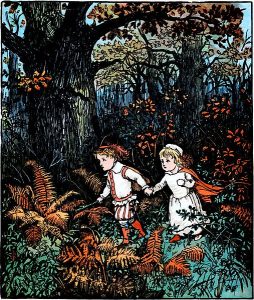The Babes in the Wood, first published as a ballad in 1595 under the title The Children in the Wood, or The Norfolk Gentleman’s Last Will and Testament, is an English fairy tale and pantomime subject.[a]The ballad has been published under at least eleven different titles, including Now Ponder Well, the beginning of the opening stanza in some versions.[1] Various prose versions exist, some extending the original short tale by adding folk heroes such as Robin Hood to give the story a happier ending. In others the main characters are given Italianate names, perhaps echoing an earlier play that may have been the inspiration for the tale.[2]
The expression “babes in the wood” has become a familiar idiom for inexperienced people finding themselves in a situation requiring experience,[3] and has been used in reference to real child murder cases.[4]
The wood in the story is popularly associated with Wayland Wood in Norfolk.[5]
Synopsis
A wealthy Norfolk gentleman and his wife fall sick and die simultaneously, leaving their children – a three-year-old boy and a younger girl – in the care of an uncle. When they come of age they will receive their inheritance, but if they should die before their uncle, then he will inherit. So the uncle hires two “ruffians” to murder the orphans. Believing they are being taken to visit London, the children set off with the men, but they so charm one of them that he is tempted to relent. A quarrel ensues, during which the harder-hearted man is killed; the other leads the children into a wood, but despite promising to return and bring them food, deserts them. The children wander, at first surviving on blackberries, before finally dying in each other’s arms.
No burial these prettye babes
Of any man receives,
Till Robin-redbreast painfully
Did cover them with leaves.
But things do not go well for the wicked uncle, owing to the “heavy wrath of God”. He loses his fortune and is forced to mortgage his property, arrested for debt, and dies in jail.
Notes
| a | The ballad has been published under at least eleven different titles, including Now Ponder Well, the beginning of the opening stanza in some versions.[1] |
|---|
References
Bibliography
External links
- Full text of the May Bell Series version at Project Gutenberg

